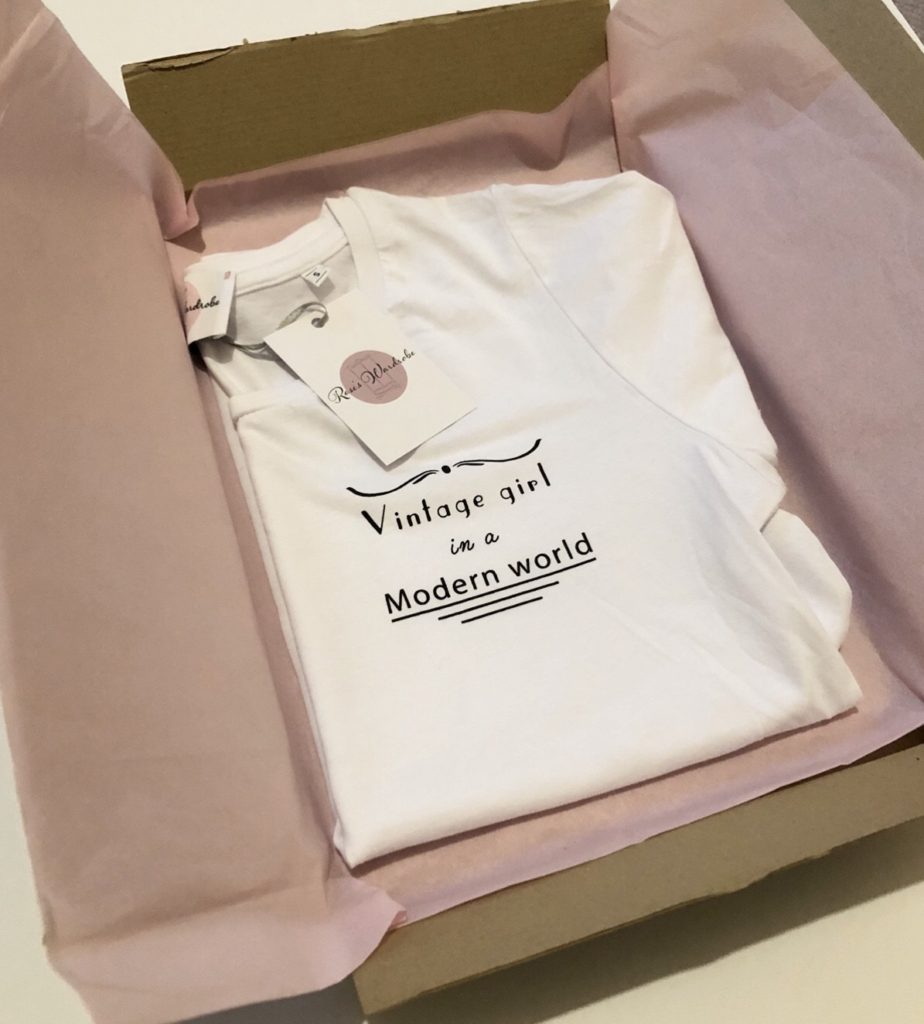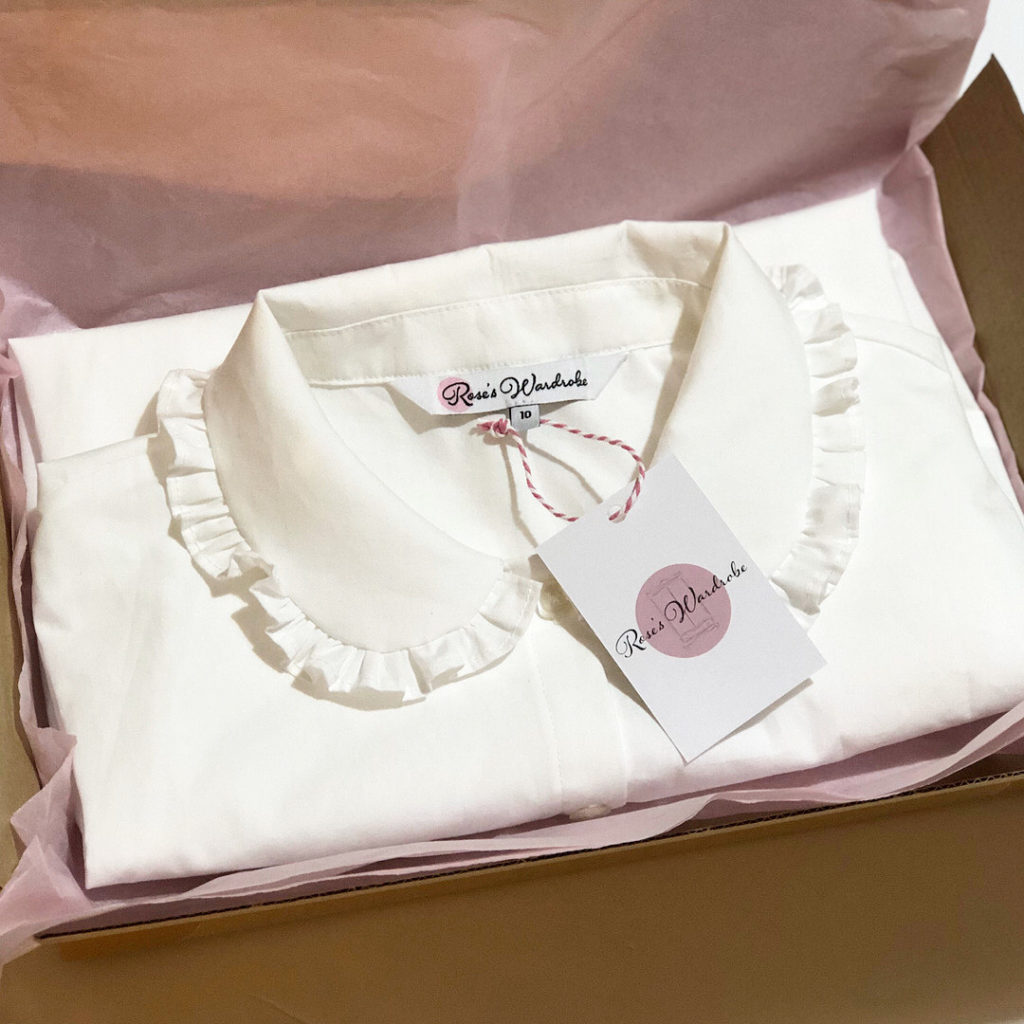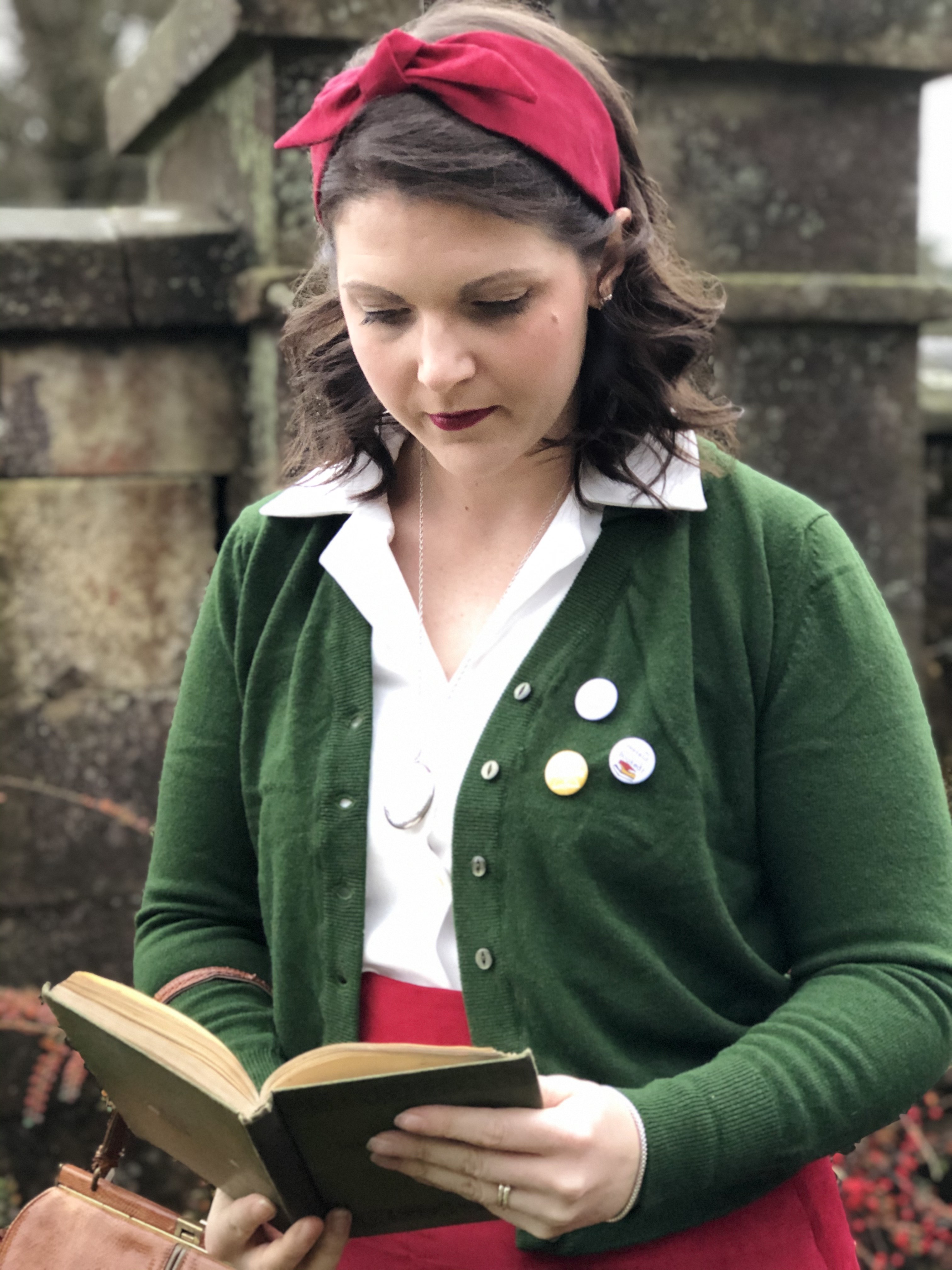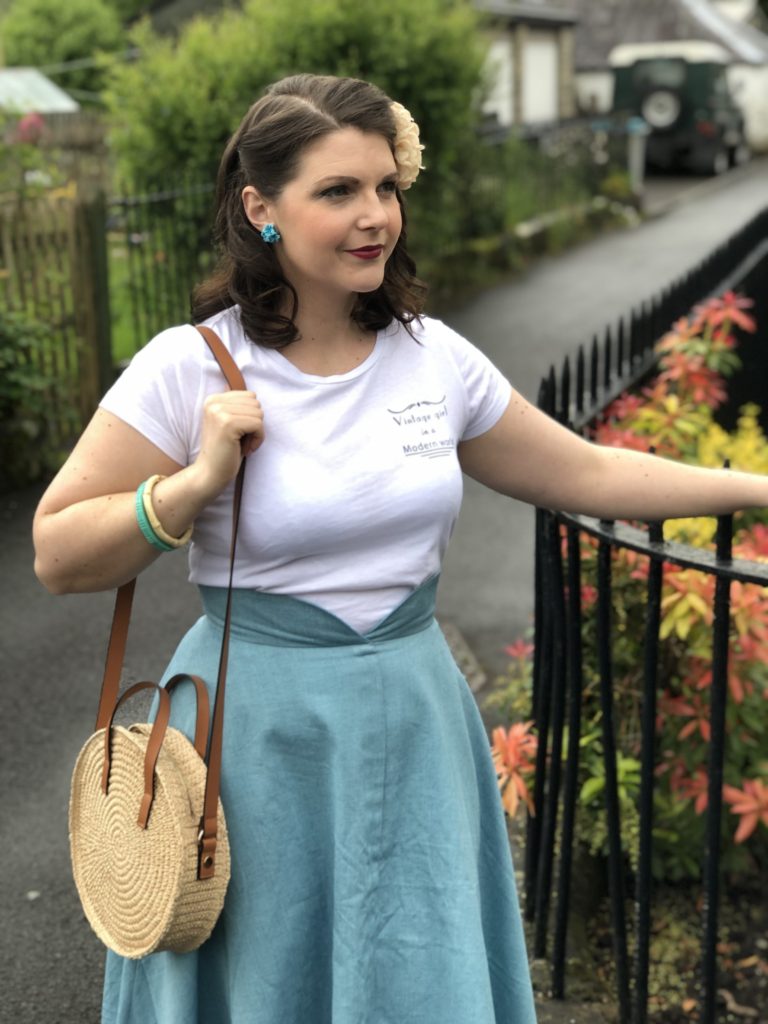Today’s interview is with the absolutely lovely Emma, who alongside her wife Leanne, runs the Scotland-based vintage-inspired (and sustainability focussed) fashion brand Rose’s Wardrobe.
Think scarf-like headbands (I was lucky enough to receive one in PR and it was the most comfortable I’ve tried, by the way!), half circle skirts, shirt dresses, and blouses – handmade to order in Langholm.
We learn more about the company, as well as discussing what it’s like setting up and running an online retail business with chronic illness, inspiring grandma’s with fabulous vintage style, and how they’re working to ensure sustainability is at the heart of everything they do.
Can you tell me a little bit about Rose’s Wardrobe?
Rose’s Wardrobe was born out of my wife’s, Leanne, and my love of vintage fashion after looking at old photos of our grandmothers Rose, the brands namesake, Edna and Patricia and years of collecting vintage sewing equipment and patterns.
We look at the styles, colours and patterns from the 1940’s to the 1960’s and recreate these for the modern woman as sustainably as we can.
Having both worked in the high street fashion industry, we decided when we started our business we wanted to really think about how we were doing things and the effect it was having on the planet.
Why did you decide to start your own business?
We decided to start our own business as we felt a passion for recreating vintage styles using luxury, limited edition, eco friendly fabrics, made to order and hopefully one day becoming the new vintage.
Can you tell me a little about your chronic illness and how this impacts how your work?
I was diagnosed with ME at the age of 17 after having lots of tests for my extreme exhaustion, limb pain and constant headaches after suffering from Glandular fever at the age of 15.
I have always been able to manage my ME by going until my body tells me otherwise and I then have to rest. I don’t normally let it get so bad that I have a major crash but it has happened more recently since starting the business because there are times you need to keep going because of deadlines and not wanting to let people down.
I find when I am working on the business it is easier to set my own schedule, rest breaks, early finishes etc but that hasn’t always been the case when working 9-5 in a full time job.
Do you have anything specifically set up to help you balance your health with your work?
I don’t have anything specific; it’s more time management and resting when I can. If I’m not having a good day Leanne is really good at letting me rest.
I’m so glad we are doing the business together. I’m also a fan of a list and highlighting priority things that need doing first.
There are a lot of people in the chronic illness community who really love vintage clothing – what draws you to it, and why do you think it’s popular in general?
I have always had a passion for history and historical fashions from the Tudors to the 1960’s but it was my Nanna that started collecting vintage sewing equipment and patterns for me when I started textiles in high school that really increased my interest.
My final collection for uni was based on the 1948 winter games and always find myself looking to the 1930s-1960s, in particular, for inspiration when designing.
I think it is popular as it’s just so elegant and the shapes and cuts of the garments are just so flattering.
It’s also such an iconic period of time in history – with amazing experiments in fashion styles. I only have the confidence to wear nods to vintage at the moment but with the garments we are making for Rose’s Wardrobe, I’m trying to experiment with what I’m wearing more.
That’s why I love our T-shirts as you can wear them with comfy jeans or a 1950’s style swing skirt!
Is inclusive fashion important to you?
Oh yes very important! We strive to be inclusive not exclusive.
We do size 8-22 as standard but are able to do other sizes whether bigger or smaller we just need to do the patterns for them, as we do the patterns ourselves we are able to do this quite quickly.
We also have the option of shortening or lengthening our dress and skirt lengths. These are some of the main reason why we do made to order garments – so that the customer can let us know if they need anything changing before we make up the garment – a lot better than having to get something altered afterwards.
We are looking into easy fit garments (at the moment all our garments have buttons or zips) so that we are even more inclusive and have accessible fashion pieces.
Can you walk me through any of the considerations you’re making when it comes to easy-fit clothing – how is this different from your current line?
We have focused on woven fabrics to start which requires zips and buttons but we are looking into some lovely organic stretch Jersey fabrics which we will look at making into easy fit tops and dresses as our range expands.
It’s difficult as we want to everything right now but with it only being the two of us (and me having my limits) it’s going to take longer to get a full range together but hopefully by the end of 2020 we will.
Sustainability is really important to you – can you walk us through the steps you’ve taken to try and ensure your business is as sustainable as possible.
When we had the idea to set up the business we knew from the very start we wanted to do things differently. We had both worked in the retail fashion industry and knew how the big companies try and get garments for a cheap as possible, cutting corners on product quality and worker health and safety.
From the start when we were looking at T-shirts we knew we wanted organic cotton and bought them from a company that are part of the Fair wear campaign – which ensures that the garment workers have good working conditions and are getting a fair wage.

When we started sourcing fabrics for garments we wanted to use organic or responsibly sourced fabrics. We are lucky enough to be able to buy some ex mill fabrics from a local mill too. So some of the fabrics we use for skirts were woven about a mile away from where we sew them up!
We are only now buying cotton threads, cotton interlining and natural fabrics and looking into recycled polyester zips. All our packaging is biodegradable or recyclable.
Did you face any challenges implementing these sustainable things as part of your business?
It is really challenging to source fabrics and components that are eco friendly but it’s something we really feel strongly about so can’t just give up because it’s hard.
We have sourced some lovely Tencel fabric, which is made from wood pulp and the chemicals used are reused over and over so it’s one of the most eco fabrics, for new blouse shapes we have designed and we are looking at other natural fabrics too.

We have to be creative with what we can source! I’d really like to get fabric printed but we still haven’t found the right fabric yet. Not everything is organic but it’s all natural fibres, do if they were to end up in landfill (which we hope not) they will decompose naturally.
Organic and natural fabrics are also a lot more expensive than polyester alternatives which is why our garments are priced higher. If we were to use man made fibres like polyester our profit margins would be a lot higher but as it’s something we are so passionate about we took the decision to reduce our margins to be able to produce quality, affordable garments.
We are not wanting to compete with the low end, mass produced, fast fashion retailer, that’s not what our business is about, we are the complete opposite to that.
Your aim is to become a zero-waste company – what things are you working on in order to achieve this in the near future?
Leanne hates it but I don’t throw anything away!
We have a scrap box and every little bit of fabric goes in it. We have a few little ideas of ways to use up the scraps coming in the new year!
We have also just bought a new (to us- it’s reconditioned) sewing machine that ties off and cuts the thread which is going to save a lot of thread wastage.
We cut headbands when we cut skirts so that we use as much of the fabric as we can. We have a long way to go to become completely zero waste but we make more steps towards it all the time.
How do you balance deadlines, customers, and other business responsibilities with looking after your health?
As we do made to order garments we just allow 1-2weeks for each order and then that gives us a realistic amount of time (with resting) to get orders ready and sent out, along with all the other jobs that are needing doing.
Like I have said before I am very lucky to have Leanne as my wife and business partner as she takes on a lot of the jobs when I am not really up to it, or more of the physical jobs (sat at a sewing machine or cutting patterns) when I need to do less physical work, like laptop stuff.
Do you have plans in place for unexpected flare-ups?
I try not to let it get so bad that I have a mega flare up but I did a few weeks ago and you just have to stop.
There is nothing more important then your health so if it’s just a case of emailing a customer to say the order will be sent out slightly late or saying no to other commitments that’s just what we would have to do.
I do struggle with feeling responsible if I feel I’m letting people down but if you just explain most people completely understand.
What are your top time management tips?
Find out when you’re at your most productive and then plan what you need to do in that time. Set jobs that don’t need very much energy (or can be done in bed or the sofa) like laptop work or planning your time out for when you are not at full power mode.
What has been the biggest challenge of running a business with chronic illness?
Definitely admitting that I can’t do everything! It has put an extra pressure on me that have made me re-realise my limits and I really need to listen to my body as I am better to be going at my pace and to still be working than doing too much and not being able to do anything until I recover.
What advice would you give to someone with chronic illness who is looking to start their own business?
I would say go for it – it’s a great way to be able to do as much or as little as you want, it can be as big or as small as you decide to make it. It’s your business so do it your way. Don’t let anyone tell you otherwise.
Only you know your limits, no one else so just tailor your business around you.
If like Rose’s Wardrobe it’s a product based business then just let customers know that the lead time is few weeks – which gives you time to not rush and makes allowances for any rest times.
Do you feel you have received much support as a chronically ill business owner? If not, what would have been helpful for you?
I am very lucky to have my own supporter in Leanne and I really, truly couldn’t of done it without her but apart from that I can’t say we have really had any help in relation to chronic illness and the business.
We would be looking to employ someone in the future to help with the business, so that will be really helpful with the day to day running and leave the more creative things up to me and Leanne, instead of us trying to do everything ourselves!
What can we expect to see from Rose’s Wardrobe in the future?
We are very excited about what 2020 is going bring for Rose’s Wardrobe! We are expanding our range to include trousers, new styles of blouses and dresses and hopefully some locally manufactured cashmere mix knitwear.
We have a stall booked at the Festival of Vintage in York on the 25th-26th April which is exciting and we also hope to get some more Rose’s Wardrobe stockists.
Thank you so much to Emma for taking the time to answer these questions today! You can find out more about Rose’s Wardrobe by visiting their website and Instagram.
If you enjoyed this post, please consider subscribing to my newsletter.




1 thought on “Rose’s Wardrobe: Running A Vintage Fashion Brand With Chronic Illness”
Natasha, I am glad that your friend Emma is enjoying her career as a seamstress. I always feel never let your illness let you down and prevent you from doing things which you enjoy. I wish Emma and her wife Leanne on their success in Rose’s Wardrobe.